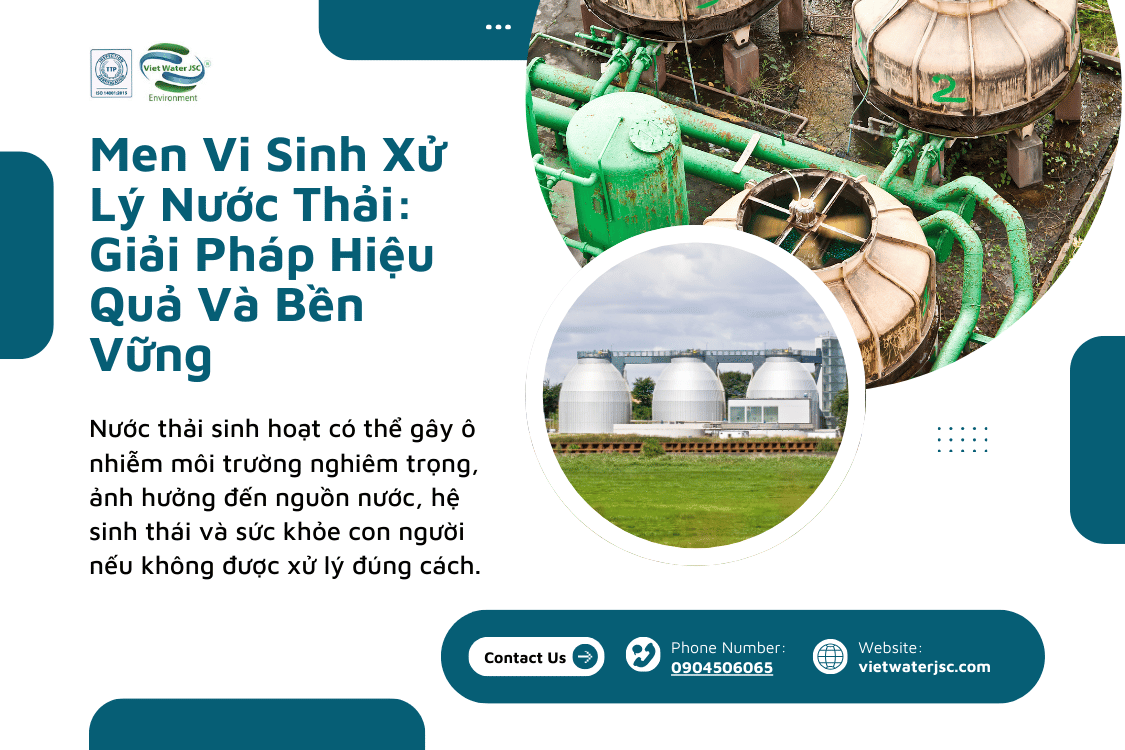Functional Food Production Wastewater Treatment
14 Nov, 2025VIET WATER provides complete wastewater treatment solutions for functional food manufacturing plants...
Wastewater treatment is a crucial challenge in protecting the environment and public health. One of the most effective and sustainable methods currently used is the application of probiotics. Probiotics are products containing microorganisms capable of breaking down pollutants in wastewater. In this article, we will explore the use of probiotics in wastewater treatment, how they work, their benefits, and their applications.

Probiotics are products that contain beneficial microorganisms, including bacteria, fungi, and protozoa, that have the ability to break down organic pollutants found in wastewater. These microorganisms can clean up pollutants, reduce BOD (Biochemical Oxygen Demand) and COD (Chemical Oxygen Demand), and improve the quality of treated wastewater.
Probiotics are commonly used in wastewater treatment systems such as those for domestic wastewater, industrial wastewater, food processing wastewater, or agricultural wastewater.
Probiotics work through a process called biodegradation. Specifically, the microorganisms in probiotics break down organic substances in wastewater into simpler compounds like CO₂, H₂O, and minerals. The breakdown process occurs in the following stages:
Using probiotics helps reduce BOD and COD levels in wastewater while improving its quality after treatment.
Using probiotics offers several significant benefits:
Probiotics help reduce the use of chemicals and complex equipment in wastewater treatment systems. This not only reduces initial investment costs but also saves on long-term operational expenses.
Unlike chemical treatment methods, probiotics do not produce harmful byproducts. The biological treatment process occurs naturally and does not pollute the surrounding environment.
The microorganisms in probiotics are highly effective at breaking down organic pollutants in wastewater. This helps reduce BOD and COD levels and improves the quality of treated wastewater.
Using probiotics helps limit the growth of odor-causing bacteria, thereby reducing the unpleasant smells often found in wastewater treatment systems.
Currently, there are various types of probiotics used in wastewater treatment, depending on the type of wastewater and specific treatment needs:
These probiotics contain aerobic bacteria that work best in systems where oxygen is continuously supplied, such as aeration tanks in domestic and industrial wastewater treatment.
These probiotics contain anaerobic bacteria, which are effective in environments with little or no oxygen. They are typically used for wastewater with high organic content, such as wastewater from food processing, oils, and paper production.
This type of probiotic contains bacteria that can function in both aerobic and anaerobic conditions, making it suitable for systems that need to adapt to varying treatment conditions.
Probiotics are widely used in various wastewater treatment systems:
Aerobic wastewater treatment systems use aerobic probiotics to break down organic pollutants in oxygen-rich environments. This method is commonly used for treating domestic wastewater and industrial wastewater with low organic content.
Anaerobic wastewater treatment systems use anaerobic probiotics to treat complex organic substances. These systems are typically used for wastewater with high levels of organic content, such as food processing, oil, and paper manufacturing wastewater.
Combined treatment systems that alternate between aerobic and anaerobic conditions offer higher treatment efficiency. These systems are flexible and can handle various types of wastewater.
VIET WATER provides effective wastewater treatment solutions using probiotics, including consulting, supplying probiotic products, and designing treatment systems.
If you need detailed advice on probiotic-based wastewater treatment solutions, contact us for the best support.